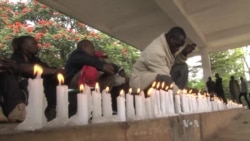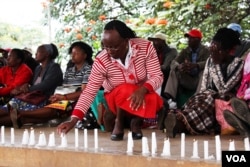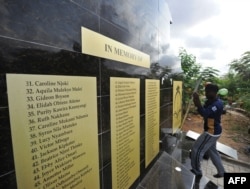Students at Kenya's Garissa University on Saturday marked the one-year anniversary since a terror attack on the eastern Kenyan school in which 148 people were killed.
Students gathered to sing hymns, light candles and share stories about their fellow students, many of whom were gunned down after a group of al-Shabab militants entered their residence hall and executed students in a siege that lasted some 16 hours.
Al-Shabab militants said they attacked the campus in retaliation for Kenyan military operations in Somalia.
Kenyan security forces were severely criticized for their slow response to the attack. According to local media, it took them at least seven hours to reach the university.
A handful of parents met in a public park in central Nairobi to remember the attack victims. The parents lit candles and spoke about their pain, trying to give words of encouragement that could help others overcome their losses.
Samuel Ojoro, one of the organizers of the memorial service, said, "We’ve gathered here today to commemorate the first anniversary since that brutal murder of our children. Yesterday we spent [all] day long in the office of the president talking to relevant authorities."
He said organizers spoke with Kennedy Kihara, principal administrative secretary in the president's office, and entrusted him to take their message to the State House.
Agnes Waweru, who lost her daughter in the attack last year, said that "I remember this day with a lot of pain. It reminds me how I lost my daughter. She was a hardworking girl, and everyone liked her. She wanted to continue with her studies so that she could live a good life.”
'Parents are crying'
Another parent who traveled from Kisii County, 370 kilometers from Nairobi, spoke of his frustration in search of compensation.
“We want to be compensated," he said. "No matter how little it is, we don’t want to be coming back here every time. Parents are crying. When they keep calling us back, they are reminding us of our children. We are requesting the government to compensate us. We don’t want to be coming back to Nairobi.”
In the meeting, organizers and group leaders, like Chairman Janai Njenga, had a tough time dissuading some parents from requesting an audience with the president and demanding compensation for their losses. Njenga said they were people taking advantage of their losses to advance their own agendas.
Njenga said organizers had not received any support from the government. Some people not involved with parents who lost children were organizing on their own, he said, adding that he wondered where they were getting the permission to hold such meetings without the parents.
For now, Garissa University victims’ families continue to try to overcome their pain, but many feel they have been abandoned by the state and their communities. Some continue to search for answers about what happened that day at the university.
Kenya has been the subject of a number of al-Shabab attacks since 2011, when the Kenyan government began sending troops to help neighboring Somalia fight the militant group.
Al-Shabab has also claimed responsibility for the 2013 attack on Nairobi's Westgate shopping center, when 67 people were killed over a period of two days.







